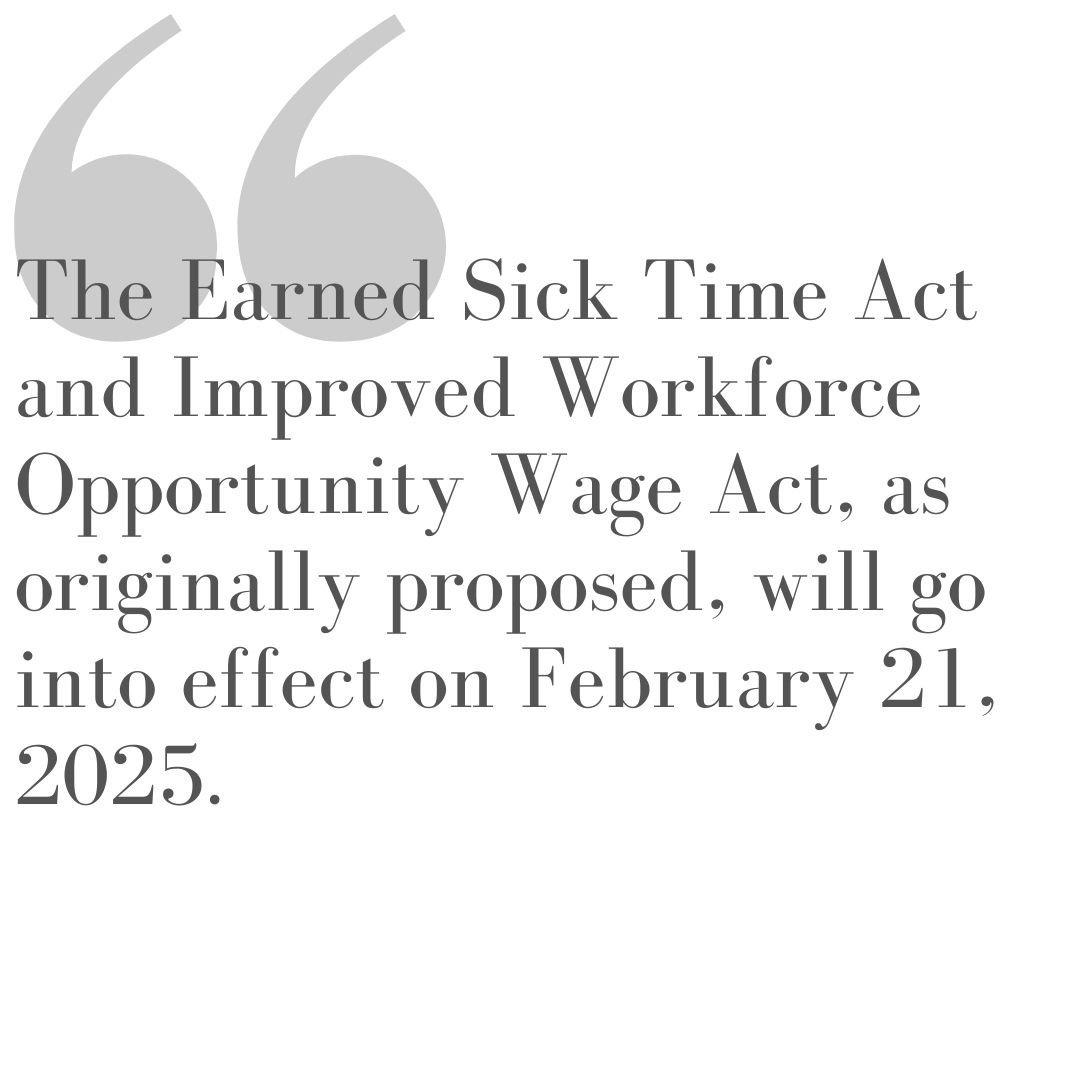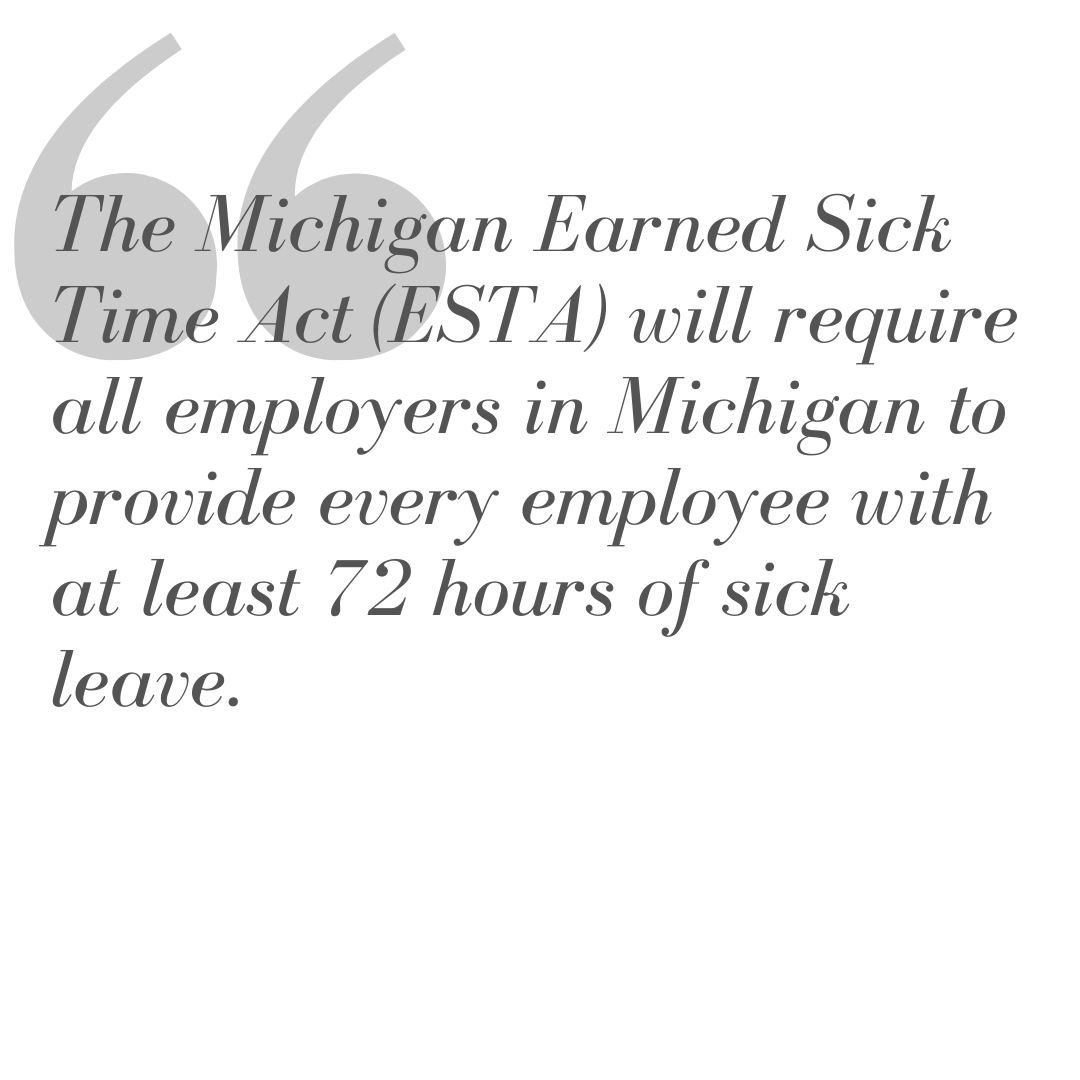Michigan Employers Must Increase Sick Time and Minimum Wage by February 21, 2025
- Deromedi, David R. McDonald, Christina K.
- Industry Alerts
Click “Subscribe Now” to get attorney insights on the latest developments in a range of services and industries.

The game of legal whiplash is over – Michigan employers (and employment lawyers) now know that the Earned Sick Time Act and Improved Workforce Opportunity Wage Act, as originally proposed, will go into effect on February 21, 2025.
How did we get here?
In an opinion issued on July 31, 2024, the Michigan Supreme Court held that the Michigan Constitution prohibited the Legislature’s action in 2018 of adopting the ballot initiatives behind the Earned Sick Time Act (“ESTA”) and Improved Workforce Opportunity Wage Act (“IWOWA”) and then amending that legislation in the same legislative session. In other words, the Court held that the Michigan Constitution does not permit the Legislature to adopt a ballot initiative and immediately amend it without voter approval, rejecting the “adopt-and-amend” strategy utilized by the Michigan Legislature. Thus, the initial ballot proposals from the voters are set to become law – again. Given that this ruling is from Michigan’s highest court, the only way to make a change to these laws is through new legislative action.
What does this mean? 
If your business employs people in Michigan, you must become compliant by February 21, 2025.
The IWOWA will increase Michigan’s minimum wage (currently $10.33 per hour) in 2025 and beyond. The State Treasurer will set the new minimum wage in the coming weeks, but we know Michigan’s new minimum wage will exceed $12 per hour ($10 per hour plus an inflation adjustment). Tipped employee minimum wage will increase to 48% of the full regular minimum wage, moving from $3.93 per hour to over $6 per hour in 2025. The tip credit toward minimum wage will eventually be eliminated.
The Michigan Earned Sick Time Act (“ESTA”) will require all employers in Michigan to provide to every employee (exempt, non-exempt, full-time, part-time, occasional, temporary, etc.) in Michigan with at least 72 hours of sick leave. For “small employers” (employers with fewer than ten employees) at least 40 of those 72 hours must be paid, and 32 hours may be unpaid. For all other employers (those having ten or more employees), all 72 hours must be paid.

- Paid sick leave, if accrued, must be accrued at 1 hour for every 30 hours worked
- Paid sick leave may be used in the smaller of an hourly increment or the increment an employer uses to count time (often by the minute)
- Sufficient front-loaded PTO may fully satisfy the paid sick leave obligation if certain conditions are met.
- Employers can require at least seven days’ advance notice for foreseeable paid sick leave.
- Employers can require documentation for the use of paid sick leave only if the leave is for longer than three consecutive days.
- Employers do not have to pay unused paid sick leave to employees on termination of employment, but carryover is required.
- Employees can sue their employers directly for violations of ESTA – and they could recover liquidated damages, costs, and attorneys’ fees.

What should you do?
Re-visit your paid and unpaid time off policies to be sure they comply with the minimum requirements in the expanded ESTA. Verify that your wages comply with the heightened requirements in the Improved Workforce Opportunity Wage Act. Contact an employment lawyer if you have any compliance concerns.
This Client Alert does not replace legal counsel, and you are encouraged to contact a Dickinson Wright employment attorney to learn how these Michigan laws apply to you and your business. Please note that this Client Alert is not a comprehensive analysis of these laws.
Related Practices
Contacts
Recent Insights
- Industry Alerts Last-Minute Changes to Michigan Earned Sick Time and Wage Laws: Effective February 21, 2025
- Articles Michigan Court of Appeals Clarifies Application of the “Plain Error” Rule
- Industry Alerts Raising Unpreserved Issues on Appeal
- March 14, 2025 Media Mentions Sara Jodka was recently quoted in the SHRM article, “Make Inclusion an Operational Strategy, Not a Standalone Program.”
- November 21, 2024 In the News Five Dickinson Wright Attorneys Recognized in 2024 Mid-South Super Lawyers
- November 19, 2024 Industry Alerts Hold Up, Wait a Minute: Judge Blocks Salary Threshold Increase and Rolls It Back to Pre-July 2024
- August 22, 2024 Industry Alerts Federal Judge Sets Aside the FTC’s Noncompete Ban
- July 19, 2024 In the News Don’t miss out on Suzanne Sukkar and Najah Allaham’s article, “H-2B Visas as Quality Solution for Hospitality: Improve Customer Service With a Fully Staffed Team,” which was published by Hotel Online.
- June 6, 2024 In the News Dickinson Wright Receives Top Rankings in 2024 Chambers USA Guide; 51 Attorneys Recognized as Leaders in their Fields


